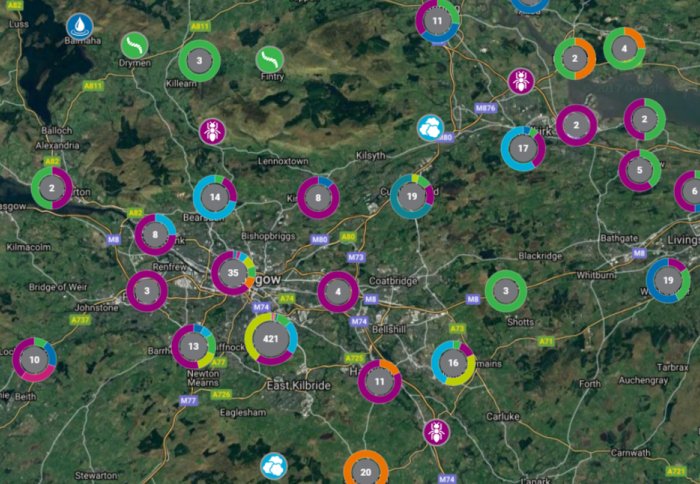Explore the environment in your area with interactive citizen science map

Citizen science data mapped around Glasgow
The OPAL Data Explorer presents more than 41,000 environmental records collected by citizen scientists throughout the UK.
What do lichens say about the air quality on your street? Has the invasive New Zealand flatworm spread to your neighbourhood?
We’re very excited to be putting this data back into the hands of the people who collected it.
– Laurence Evans
These questions and more could now be answered using thousands of environmental records submitted to the Open Air Laboratories (OPAL), which is run through the Centre for Environmental Policy at Imperial.
The OPAL Data Explorer allows users to explore the data they have submitted, or view patterns and trends in their local area and nationally. Data covers all eight of OPAL’s currently active UK wide surveys:
- Assessing air quality by recording the lichens growing on trees
- Checking out the biodiversity of hedgerows
- Mapping the distribution of invertebrates with the bugs count,
- Finding out how far the invasive New Zealand flatworm has spread in the UK
- Investigating the diversity of pollinating insects, including bees and butterflies, and their associated habitats
- Improving knowledge about earthworms and the soil they live in
- Tracking tree health by spotting signs of disease
- Discovering the water quality of lakes and ponds
OPAL data has already made a valuable contribution to science, and now the wealth of information gathered by OPAL participants has been made easily accessible online.
OPAL director Dr David Slawson said: “I hope that visitors will learn something new about their local environment. And if they do happen to find that no data has been collected near them then I hope they might change that by going out and doing one of OPAL’s citizen science surveys.”
The data can be explored by map, letting users see what survey results have been submitted for their local county, town or even local school grounds. The information can also be analysed in graphs for the air, bugs count and water surveys.
Laurence Evans, OPAL Data and Evaluation Manager, said: “We’re very excited to be putting this data back into the hands of the people who collected it.
“Much of our data was collected by schools and we think the OPAL Data Explorer is a valuable tool for teachers, enabling them to engage pupils with data analysis and develop numeracy, literacy and ICT skills.”
The Data Explorer is still in development, with new features on the way, and the team welcome any feedback.
Article text (excluding photos or graphics) © Imperial College London.
Photos and graphics subject to third party copyright used with permission or © Imperial College London.
Reporter
Hayley Dunning
Communications Division
Ms Alexandra Franklin-Cheung
Centre for Environmental Policy